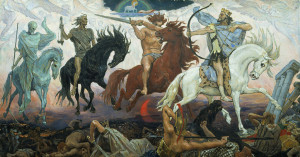
Every few years, there is a big hubbub about the end of the world. Many predicted the world would end in the year 2000, and others predicted it would happen with the beginning of the new millennium in 2001. The Japanese cult Aum Shinrikyo, which carried out a deadly terrorist attack on the Tokyo subway system in 1995, predicted that we would all die in a nuclear holocaust in 2003. Pat Robertson, an influential leader in Baptist Christianity, once predicted that the Earth’s destruction would occur in 2007.
More recently, Harold Camping, the evangelical Christian founder of the Family Radio network, memorably predicted that the Rapture would occur in May 2011 . . . and when it didn’t, he revised his prediction to October of the same year . . . and then he stopped trying to pick dates. The ancient Mayan calendar ran out on December 21, 2012, and many claimed that would be the day the world would end, because when you want to know about the future you should always ask the ancient Mayans.
Every time this comes up, I say the same thing: No, the world will end on April 15, 2033. Well, I’m not entirely certain . . . it could also be on April 17, April 22, or April 24 of the same year.
Of course this is all a bit tongue-in-cheek. I don’t have any inside knowledge, and I am cognizant of Jesus’s statement that, “But of that day and hour no one knows, not even the angels of heaven, nor the Son, but the Father only” (Matthew 24:36, RSV-CE), and the Holy Spirit’s admonition recorded by Saint John, warning that, “ . . . you will not know at what hour I will come upon you” (Revelation 3:3, RSV-CE). So, in reality, your guess is as good as mine. But I have an idle curiosity about it none-the-less.
Much of the apocalyptic thought in the late 1990s and early 2000s revolved around the two-thousandth anniversary of the birth of Jesus Christ in Bethlehem, which would have been some time around the year 2000. We suspect that our calendar system is not exactly correct, and that Jesus was probably born some time between 6 B.C. and 1 B.C., so this would have put the two-thousandth anniversary between 1995 and 2000. But I think a more likely date would be two thousand years after Christ’s crucifixion, or perhaps his resurrection, as these were the most important moments in his earthly ministry.
Based on the available historical and scriptural evidence, it is most likely that Jesus was crucified by the Roman government on the Friday nearest to the Jewish Passover in A.D. 33, and then was resurrected on the Sunday following. So the two-thousandth anniversary of Christ’s crucifixion and resurrection would be in the year 2033, and should be celebrated according to the Christian liturgical calendar. In 2033, Good Friday will be celebrated on April 15 and Easter will be celebrated on April 17. Of course, there is a well-known discrepancy between how the date of Easter is calculated in the western (i.e., Catholic) and eastern (i.e., Orthodox) churches, so if our Orthodox brethren have it ‘right,’ the dates may be April 22 and 24 instead. I personally incline toward the Catholic celebration of Good Friday as the most logical and likely possibility among these four dates.
But there’s no reason to assume that two-thousand is some magic number of years after which there should be a major religious event. It’s a nice, round number, which is probably why it appeals to people, but when God uses numbers symbolically in scripture they’re almost always in multiples of seven or twelve. And apocalyptic predictions, thus far, have all been wrong . . . including a widespread belief throughout Christendom that the world would end in A.D. 1033, the one-thousandth anniversary of Christ’s death and resurrection, which might have had more punch than the two-thousandth anniversary.
In other words, we should probably keep contributing to our 401k’s.
